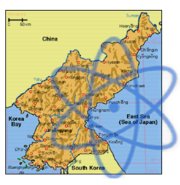North Korea declares it has nuclear weapons; cancels talks
Thursday, February 10, 2005
North Korea — The state-run Korean Central News Agency has released a statement from the North Korean Foreign Ministry cancelling the ongoing six-party talks aimed at ending North Korea's nuclear weapon development programs. The statement also declared for the first time that North Korea has nuclear arms, announcing that it plans to "bolster its nuclear weapons arsenal".
The statement declared, "We had already taken the resolute action of pulling out of the Nuclear Nonproliferation Treaty and have manufactured nuclear arms for self-defense to cope with the Bush administration's evermore undisguised policy to isolate and stifle the DPRK [North Korean government]."
"Nuclear weapons will remain [a] nuclear deterrent for self-defense under any circumstances," said the ministry. "The present reality proves that only powerful strength can protect justice and truth."
Previously, on February 4, the state-run Pyongyang Radio carried a reaction to the inauguration speech of US President George Bush: "In his inauguration speech, Bush trumpeted that 'fire of freedom will reach dark corners of the world.' This is nothing but a plot to engulf the whole world in a sea of war flames and rule it by imposing a freedom based on power."
Technical experts and politicians have advised though that this announcement might still need to be taken with suspicion, however, as North Korea has made large announcements before making large demands many times in the past as a form of bluffing. Because they have never shown any outside experts concrete proof of their having successfully extracted the plutonium from their reactors, nor that they have managed to perform the complicated chemistry and engineering necessary to develop a prototype nuclear weapon design, and have not performed the requisite first nuclear test, their nuclear status, though declared, is being viewed as somewhat ambiguous. It is also unknown whether their purported nuclear weapons are sophisticated enough to fit onto their missiles, a complicated task to achieve without testing or outside assistance.
Recent diplomatic relations
New evidence of nuclear sales
A week earlier, new information about North Korean sales of nuclear materials had come out - including allegations that they had provided uranium to Libya's now-defunct nuclear program.
In the following days, President Bush's public rhetoric with respect to North Korea seemed to have softened, and his administration sent a new envoy to the Chinese, South Korean, and Japanese governments to discuss pressuring North Korea to give up its nuclear arms development. The envoy, Michael Green (an Asia expert on the National Security Council), was sent to meet with Chinese president Hu Jintao with a letter from President Bush "written to underscore the greatly heightened urgency" of the situation. Green also met with South Korean President Roh Moo-hyun and Japanese Prime Minister Junichiro Koizumi.
South Korean foreign minister visits the US
This week, the Yonhap news agency reported (via AFP) that South Korean Foreign Minister Ban Ki-moon was also travelling to Washington, DC, to talk with US Secretary of State Condoleezza Rice and other US officials about North Korea's nuclear weapons program.
Sources
- Mark Baker. "North Korea: Is Pyongyang Bluffing About Its Nuclear Weapons?" — Radio Free Europe, February 11, 2005
- "North Korea admits having nuclear weapons, pulls out of talks indefinitely" — Japan Today, February 10, 2005
- "NKorea Says Made Nuke Weapons, Shuns 6-Way Talks" — Reuters, February 10, 2005
- Associated Press. "North Korea Admits It Has Nuclear Weapons" — Las Vegas Review-Journal, February 10, 2005
- Associated Press. "North Korea claims nuclear weapons" — CNN, February 10, 2005
- New York Times. "Bush sent envoy to China over Korea arms" — IHT, February 10, 2005
- "Bush Sent Envoy to China to Push for N. Korea Talks" — Reuters, February 10, 2005
- AFP. "South Korean foreign minister leaves for US talks on North Korea" — Asia Pacific News, February 10, 2005
- Daniel Sneider, Mercury News. "Bush softens North Korean stance to jump-start talks (COMMENTARY)" — New Kerala, February 9, 2005
- With details on what Green may have said, and a history of the alleged NK-Libya connection.
- With details on what Green may have said, and a history of the alleged NK-Libya connection.


